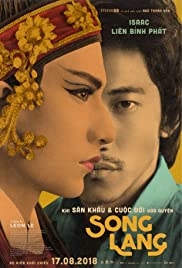
SONG LANG
Vietnam, 2018, 98 minutes, Colour.
Lien Binh Phat, Isaac, Phuong Minh.
Directed by Leon Le.
Song Lane is a traditional Vietnamese musical instrument. The narrator of this story, Dung, suggests it can also be a traditional symbol of something which anchors one’s life and purpose.
The setting is Vietnam in the 1990s, in the poorer parts of the city, but also in the theatre. There is a performance of a Vietnamese Opera, long excerpts on stage, beautifully costumed, melodramatic in style.
Dung grew up in a theatre atmosphere, a happy boy, admiring his father and his musical ability, watching performances with delight, but the tragedy of his mother departing. It is surprising to find that he has grown up as a loner, looking tough with his moustache, a debt collector, not afraid to be brutal, working for a shrewd businesswoman, Auntie Nga. There are several episodes of his rough tactics, unforgiving because it is his job, but some lyrical moments with two little girls at home while he awaits the return of their parents – which leads to a brawl, and the news that the mother had committed suicide and poisoned her little girls. In fact, the distraught husband, will eventually be his nemesis.
One of his jobs is to demand repayment from a theatrical company, pouring petrol on their costumes but saved by the arrival of the central actor. Later, Dung goes to a performance and is enthralled.
The melodrama of the film is that Dung is in a restaurant when a group accost the actor and start a fight, Dung intervening and rescuing the actor, taking him home, the beginning of a tentative relationship, their gradual confiding in each other, the actor finding some books and songs from the past, Dung wanting him to sing, getting out his musical instruments and accompanying him.
There is a sombre ending to the film, the distraught father attacking Dung, Dung bringing a gift of his lost keychain to the actor, the actor urging Dung to come with his instruments to audition for the theatre company.
A sad film.
1. Title? The musical instrument? The initial explanations? The symbol of an anchor in life, purpose?
2. The Vietnam setting, the 1990s, the city, the streets, the businesses, people in debt, loan shark, debt collection? The contrast with the music and the opera, the singing, costumes and decor? The background musical score?
3. The structure of the film, the focus on Dung, his life and work, the insertions of the flashbacks, the young boy, his family, music and performance, family difficulties?
4. The portrait of Dung, his age, living alone, the debt collection, violence and threats, treatment of people, his job and seemingly impervious to violence? His visits to Auntie Nga, her supervision? Her philosophy of lending, seeing her with the young woman, strict and demanding? Dung and his loyalty?
5. The various episodes, the debtors, pleading for extensions? His visiting the debtor, away at the hospital with his wife, the two little girls, Dung staying with them, peeling the fruit, sharing the play? The parents arriving home, the confrontation, the little girls and their fear? The later news of the mother poisoning the girls, her suicide, the visit to the hospital, the desperation of the Father? Confronting Dung? And the nemesis with the killing in the theatre?
6. The theatre company, their debts, Dung threatening to burn the costumes, pouring the petrol? The desperate mother, the arrival of Linh Phung, moments of repayment after the performance? The young man, the rehearsals, the old master, urging more heart rather than just technical excellence? The reprisal of this at the end, his experience with Dung, grief at the death? Manifest on stage, the audience response, tears and applause?
7. Dung, going to the theatre, his memories, his father, the musical tradition and the instrument, playing it? His happiness watching performance? The departure of his mother, the grief? His idealising his father? His father and the instrument, playing? His father’s photo in the gallery of photos? His decision to go to the performance, watching, seeming impassive, absorbed, applauding?
8. The actor, in the bar, having the drink, the drunken group taunting him, the fight, his being bashed, Dung stepping in, demolishing the group? Taking the actor home? His coming
to consciousness, missing the performance? The troupe and their having to get another actor to go on, the fuss?
9. The actor, his experience with Dung, the memories of the petrol and the threats? His injuries? Dung helping him, but the actor taking his clothes and leaving? Losing his key? Returning? The tension, the discussions, Dung and his response? Going out, the meal, the sharing of memories, the actor opening up, Dung gradually revealing himself? Sleeping, waking, the actor finding the books, the song, Dung wanting him to sing, opening up the instruments and playing? The actor suggesting he come to audition? Dung’s reluctance?
10. Dung, the collection, the old man of the funeral, Dung and his selling all his instruments and souvenirs, giving the money to the old man?
11. The performance, Dung finding the keychain, wrapping it for the actor, going to the theatre, his being stabbed, the focus on the blood in the tiles and cracks, the rain coming down and washing it away?
12. The actor, the performance, heartfelt, his tears? The audience response? His walking on the pavement, the rain and the blood?
13. The operatic tone of the film, the long excerpts from the Vietnam Opera, the traditions, the beginnings of love between Dung and the actor, tragedy?